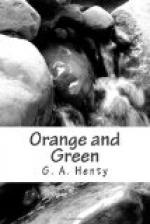As the armies marched west, their path was marked by wholesale outrage and destruction. Although protections were granted to the peasants and inhabitants of the towns and villages through which the armies marched, they were entirely disregarded by the soldiers, who plundered, ill used, and sometimes murdered the defenceless people, carrying away without payment all provisions on which they could lay their hands.
The king sometimes hanged those who were caught in these acts of plunder and slaughter, but this had but little effect. The Dutch soldiers, alone, maintained their order and discipline. The foreign mercenaries, composed for the most part of the sweepings of the great cities, behaved with a brutality and cruelty almost without example, and which was acknowledged by all the historians of the time, Protestant as well as Catholic. Indeed, the Protestant inhabitants suffered even more than the Catholics, for many of the latter fled at the approach of the army, while the Protestants, regarding them as friends and deliverers, remained quietly at home, and suffered every insult and outrage at the hands of this horde of savages, who were perfectly indifferent as to the religion of those they plundered.
Captain Davenant’s troop was with the force which had retired to Athlone, and there awaited the approach of the column of General Douglas. The reports of the conduct of the enemy, that were brought in by the flying peasants, filled the Irish troops with indignation and rage, and when, on arriving before the town, General Douglas sent a messenger to demand its surrender, Colonel Grace, who commanded, only replied by firing a pistol towards him.
Athlone stood on either side of the Shannon. The town on the eastern bank of the river was called “the English town,” that on the western “the Irish “—a distinction existing in many of the Irish towns, where the early English settlers found it expedient to live apart from the Irish, for mutual protection against attack. Colonel Grace had retired to the west bank of the river, which was strongly fortified, destroying the English town and breaking down part of the bridge across the river.
The garrison consisted of three regiments of foot and nine troops of horse; and when Douglas erected his batteries and opened fire on the castle, they replied briskly, and their guns got the better of those in the batteries. A strong detachment of horse and mounted grenadiers was sent by Douglas to Lanesborough, some miles north of the town, with orders to pass the river at that point, but the post was held by Irish troops, who easily repulsed the attempt.
It was next proposed to pass the river at a ford a short distance from the bridge; but the troops had little heart for the enterprise, as the ford was covered by field works erected by the Irish.
The assailants were already reduced to considerable straits. They had consumed all provisions found in the town, plundering without mercy the Protestant inhabitants, who had been well treated by the Irish troops, while the conduct of the army effectually deterred the country people from bringing in provisions.




